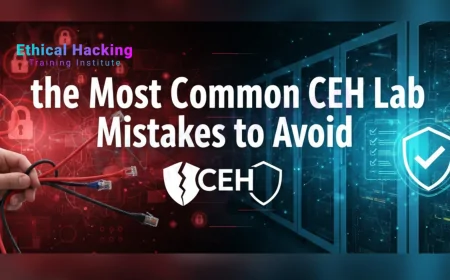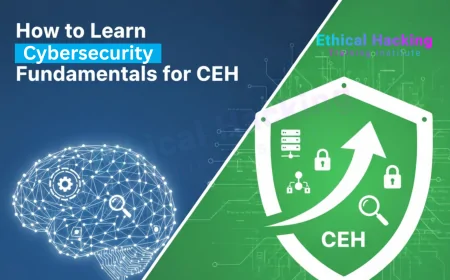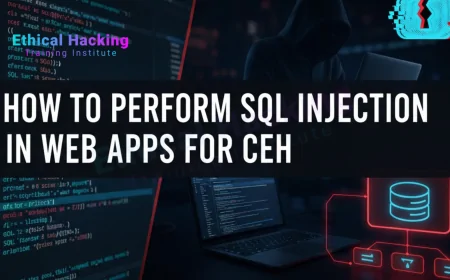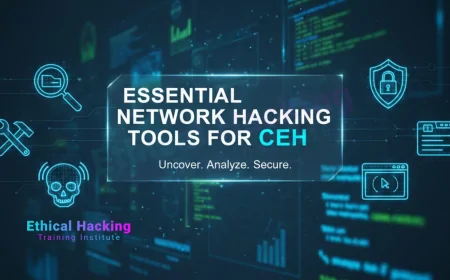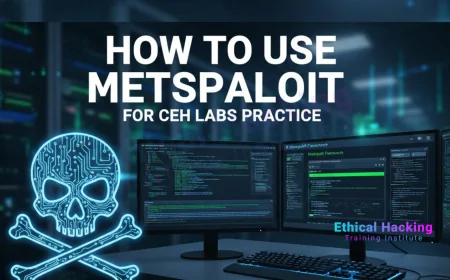What is a Computer Hacking Forensic Investigator (CHFI) and Why You Should Become One | CHFI Career Guide: What It Is, What You’ll Do, and Why You Should Consider It
Learn what a Computer Hacking Forensic Investigator (CHFI) does and why you should become one. Discover skills, roles, certification, salary & career paths.
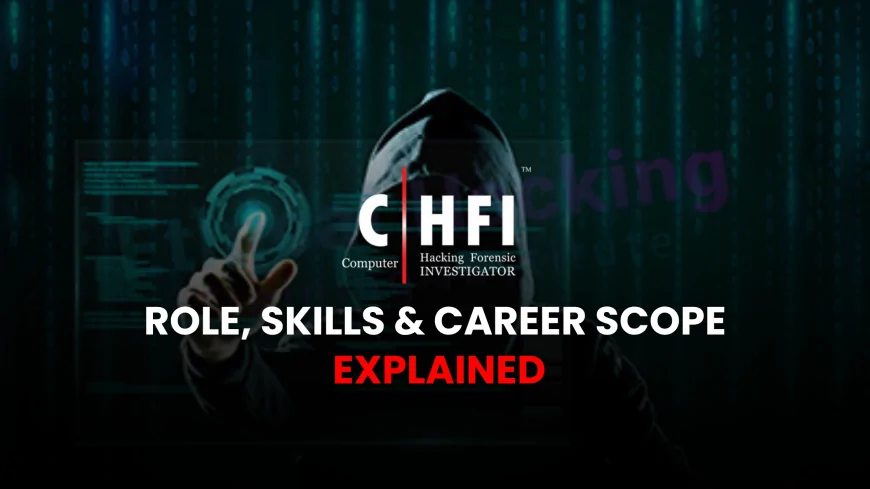
Table of Contents
- What is a CHFI?
- Role & Responsibilities of a CHFI
- Skills Required to Become a CHFI
- CHFI Training & Certification Path
- Essential Tools & Techniques
- Career Benefits & Growth Opportunities
- Popular Job Titles for CHFI Professionals
- Industries That Hire CHFI Experts
- Salary & Market Demand
- A Day in the Life of a CHFI
- Challenges Faced by CHFI
- CHFI vs Other Cybersecurity Roles
- Future Trends in Digital Forensics
- Ethical and Legal Considerations
- How to Start a CHFI Career
- Recommended Learning Resources
- CHFI Certification Steps
- Advancing Beyond CHFI
- Frequently Asked Questions
- Conclusion
What is a CHFI?
CHFI stands for Computer Hacking Forensic Investigator. It’s a certification by the EC‑Council validating your ability to investigate cybercrimes, collect digital evidence, and perform forensic analysis on computer systems, networks, and mobile devices.
Role & Responsibilities of a CHFI
- Identify and preserve digital evidence following legal chain‑of‑custody procedures
- Perform forensic imaging and analysis on hard drives, memory, and mobile devices
- Investigate system intrusions, malware infections, and data breaches
- Recover deleted files and reconstruct timelines of malicious activity
- Prepare detailed forensic reports and present findings in court or boardrooms
Skills Required to Become a CHFI
- Technical skills: file systems, memory forensics, network logs
- Tool expertise: EnCase, FTK, Autopsy, X-Ways, Volatility
- Soft skills: analytical mindset, attention to detail, clear communication
- Legal awareness: laws, privacy regulations, courtroom procedures
CHFI Training & Certification Path
CHFI can be earned via:
- Self-paced online courses
- Instructor‑led bootcamps (5–7 days intensive)
- Live virtual classroom training
- Corporate group training with customized labs
Essential Tools & Techniques
Key tools you’ll master include:
- EnCase & FTK: Evidence acquisition and analysis
- Autopsy/SleuthKit: Open-source disk forensics
- Volatility: Memory dump analysis
- Cellebrite: Mobile device forensics
- Wireshark: Network packet inspection
Career Benefits & Growth Opportunities
- High job demand and job satisfaction
- Access to exciting roles in cybersecurity and law enforcement
- Global recognition and career stability
- Pathway to advanced roles like GCFA, CFCE, OSCE
Popular Job Titles for CHFI Professionals
- Forensic Analyst
- Incident Responder
- Digital Forensics Investigator
- eDiscovery Specialist
- Malware Forensics Analyst
Industries That Hire CHFI Experts
Key sectors include:
- Government/Defense and military
- Law enforcement and forensics labs
- Banking and financial services
- Consulting and cybersecurity firms
- Healthcare and legal services
Salary & Market Demand
CHFI roles are well‑paid:
- India: ₹6‑15 LPA depending on level and experience
- Global: $70K–$120K+ for mid‑level roles
A Day in the Life of a CHFI
Daily tasks include evidence collection, log analysis, creating forensic images, writing reports, and liaising with legal teams. It’s a mix of technical analysis and cross‑functional communication.
Challenges Faced by CHFI
- Handling encrypted or anti‑forensic data
- Keeping up with evolving malware techniques
- Managing large datasets under time pressure
- Ensuring legal admissibility of recovered evidence
CHFI vs Other Cybersecurity Roles
| Role | Focus Area | Typical Tools |
|---|---|---|
| CHFI | Digital Forensic Investigation | EnCase, FTK, Volatility |
| CEH | Offensive Hacking | Metasploit, Burp Suite |
| OSCP | Penetration Testing | Kali Linux, custom exploits |
Future Trends in Digital Forensics
- AI-powered analysis for faster case triage
- IoT and cloud forensics on the rise
- Mobile encryption and anti-forensics countermeasures
- Integration of threat intelligence and forensic data
Ethical and Legal Considerations
CHFI professionals must strictly follow laws around privacy, evidence handling, and ethical codes. Non-compliance can invalidate investigations or breach regulations.
How to Start a CHFI Career
- Build a foundation in networking and operating systems
- Take introductory forensics courses and labs
- Enroll in CHFI training (online or bootcamp)
- Practice on realistic forensic challenges
- Attempt the CHFI exam & get certified
Recommended Learning Resources
- EC-Council official CHFI study material
- Hands-on labs on Autopsy, FTK Imager
- Forensic blogs, webinars, and malware analysis forums
- Books like "Incident Response & Computer Forensics"
CHFI Certification Steps
- Enroll in CHFI exam
- Study the domains (forensics process, mobile, network)
- Practice mock tests
- Pass the exam (150 MCQs, 4 hours)
- Submit proof of education/experience if required
Advancing Beyond CHFI
- Specialize in malware forensics or mobile forensics
- Get advanced certs like GCFA, CFCE, OSCE
- Participate in forensic CTFs; publish research or tools
Frequently Asked Questions (FAQs)
1. What does CHFI stand for?
CHFI stands for Computer Hacking Forensic Investigator.
2. Who offers CHFI certification?
The certification is offered by the EC‑Council.
3. Is CHFI suitable for beginners?
Yes, but foundational knowledge in IT and cybersecurity is recommended.
4. How long is CHFI training?
It ranges from 5–7 day bootcamps to 8–12 week online programs.
5. What is the CHFI exam format?
150 multiple-choice questions with a 4-hour time limit.
6. Can CHFI help me get a job?
Yes, it qualifies you for roles like forensics analyst and incident responder.
7. How much does CHFI cost?
Training costs vary—₹80k–₹150k in India; exam fee extra unless bundled.
8. How often must I recertify?
CHFI is valid for 3 years; renewal requires EC‑Council Continuing Education credits.
9. What jobs can I do after CHFI?
Forensic analyst, digital investigator, eDiscovery specialist, incident responder, and more.
10. Are labs included?
Yes, practical labs using EnCase, FTK, and memory forensics tools are part of training.
11. Is CHFI recognized globally?
Yes—widely recognized by government agencies, law firms, and financial institutions.
12. Is CHFI better than CEH?
The two are complementary—CHFI is for forensic analysis, while CEH is for ethical hacking.
13. Can I study CHFI online?
Absolutely—many providers offer live virtual and self-paced options with labs.
14. Does CHFI cover mobile forensics?
Yes, including smartphone analysis and data extraction techniques.
15. Is legal knowledge required?
Basic legal understanding is necessary to maintain evidence admissibility in court.
16. What are chain-of-custody procedures?
It’s a documented process ensuring evidence integrity from seizure to presentation.
17. Does CHFI prepare me for court testimony?
Yes, training includes courtroom readiness and report writing modules.
18. What tools do I use daily?
Tools include EnCase, FTK, Autopsy, X-Ways, Volatility, Cellebrite, and Wireshark.
19. What's the future of digital forensics?
Trends include AI-driven analysis, cloud forensics, IoT investigation, and threat intelligence integration.
20. How do I start?
Begin with introductory IT courses, enroll in CHFI training with labs, practice on forensic challenges, and pass the official exam.
Conclusion
Becoming a CHFI equips you with in-demand forensic skills that combine technical prowess, legal readiness, and ethical responsibility. By mastering evidence collection, timeline analysis, and breach mitigation, you carve a future in a high-stakes, fast-evolving cybersecurity field. Whether aiming for government, corporate, or consultancy roles, CHFI certification is a powerful step toward a meaningful career protecting digital justice.
What's Your Reaction?
 Like
0
Like
0
 Dislike
0
Dislike
0
 Love
0
Love
0
 Funny
0
Funny
0
 Angry
0
Angry
0
 Sad
0
Sad
0
 Wow
0
Wow
0






